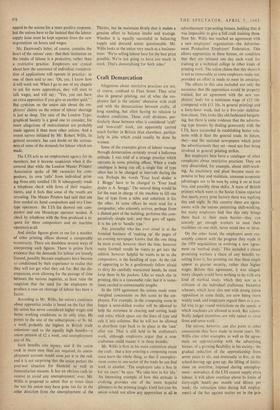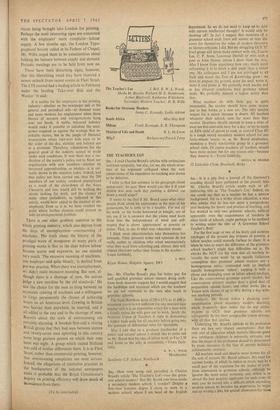Craft Demarcation
Allegations about restrictive practices are not, of course, confined to Fleet Street. They arise also in general printing, out of what the em- ployers feel is the unions' obsession with craft and with the demarcations between crafts; of long standing, but often having no relation to modern conditions. These craft divisions, par- ticularly those between what is considered 'craft' and 'non-craft' work, are apparently carried much further in Britain than elsewhere, particu- larly in jobs which could readily be done by women.
Some of the examples given of labour wastage through demarcation certainly reveal a ludicrous attitude. I was told of a strange practice which operates in some printing offices. When a trade catalogue is being run off, a single line of type often has to be changed at intervals during the run. Perhaps the words 'Your local dealer is J. Bloggs' have to be changed to 'Your local dealer is A. Snoggs.' The natural thing would be for the man in charge of the machine to lift one line of type from a table and substitute it for the other. In some offices he must send for a compositor, who solemnly arrives, perhaps from a distant part of the building; performs this com- paratively simple task; and then goes of again. It is his job to 'handle type.'
Any journalist who has ever stood in at the frenzied business of 'making _up' the pages of an evening newspaper knows that the one thing he must avoid, however short the time, however many football results he wants to get into the edition, however helpful he wants to be to the compositors, is the handling of type. At the risk of appearing to be a gentlemanly fellow afraid to dirty his carefully manicured hands, he must keep them in his pockets. Like so much else in printing, this is a reasonable rule; but it is some- times carried to unreasonable lengths.
In the 1959 agreement the unions made some marginal concessions on this score to the em- ployers. For example, in the composing room in future a semi-skilled worker will be allowed to help the storeman in clearing and sorting leads and rules, which space out the lines of type and rule it into columns. But he will not be allowed to distribute type back to its place in the 'case' after use. That is still held to be craftsman's work, although employers argue that a non- craftsman could master it in three months.
' Mr. Willis is firm in his main contention about the craft : that a boy entering a composing room must learn the whole thing, so that if unemploy- ment comes in one sector of the trade he can find work in another. 'The employers take a boy in for six years,' he says. 'We take him in for life.' An interesting example of how this attitude is evolving provides one of the more hopeful glimmers in the printing jungle. Until last year his union would not allow any apprentices at all in advertisement type-setting houses, holding that it was impossible to give a full craft training there. Now Mr. Willis has reached an agreement with a new employers' organisation—the Advertise- ment Production Employers' Federation. This allows apprentices in these houses, on condition that they are released one day each week for training at a technical college in other kinds of printing work. The union claims that this shows it is not as immovable as some employers make out, provided an effort is made to meet its anxieties.
The efforts in this case included not only the assurance that the apprentices would be properly trained, but an agreement with the new em- ployers' body for a minimum wage of £13 10s. (compared with £11 10s. in general printing) and a forty-hour week, tied to a five-year stabilisa- tion clause. This looks like old-fashioned bargain- ing, but there is some evidence that the advertis- ing type houses, by dealing generously with the LTS, have succeeded in establishing better rela- tions with it than the general trade. In future, they—and the national newspapers which print the advertisements they set—need not fear being involved in general printing strikes.
But employers here have a catalogue of other complaints about restrictive practices. They are very dissatisfied, for example, about shift-work- ing. As machinery and plant become more ex- pensive to buy and maintain, immense economic advantages are to be won by using it on at least two, and possibly three shifts. A team of British printers which went to the Soviet Union reported that nearly every print factory there was working day and night. In this country there are agree- ments with the unions permitting shift-working, but many employers find that this only brings them back to their main barrier—they can scarcely get enough workers to man their machines on one shift, never mind two or three.
On the other hand, the employers seem rea- sonably content with the progress they made in the 1959 negotiations in evolving a new 'agree- ment on 'method study.' This included a clause promising workers a share of any benefits re- sulting from it, but pointing out that these might appear as greater security, rather than higher wages. Before that agreement, it was alleged, many chapels would have nothing to do with any kind Of method study, which they saw as a criticism of the individual craftsman. Incentive schemes, which have also met with strong union opposition in some fields, are now being more widely used, and 'employers regard them as a use- ful way to get round restrictions on the speeds At which machines are allowed to work. But scienti- fically judged incentives are only suited to some firms and some work.
The unions, however, can also point to other concessions they have made in recent years. M r.
Willis cites other examples, as well as the agree- ment on apprenticeship with the advertising houses, of a growing flexibility in his society : the gradual reduction of the apprenticeship from seven years to six, and eventually to five, as the school-leaving age goes up; the lifting of linjita- lions on overtime, imposed during unemploy- ment—nowadays, if the LTS cannot supply extra labour, it will allow overtime above its limits of forty-eight hours per month and fifteen per week; the relaxation (also during full employ- ment) of the bar against matter set in the prix
vinces being brought into London for printing. Perhaps the most interesting signs are concerned with the employers' main complaint—labour supply. A few months ago, the London Typo- graphical Society called in 'its Fathers of Chapel; Mr. Willis urged them to be conscientious about holding the balance between supply and demand. Periodic meetings are to be held from now on.
There have been disturbing signs, however, that this liberalising trend may have received a severe setback from recent events in Fleet Street. The LTS journal had a leading article in February under the heading 'Take-over Bids and the Worker.' It said :
It- is useless for the employers in the printing industry—whether on the newspaper side or the general and periodical side--to demand more and more workers for employment when these threats of mergers and amalgamations hang over our heads. A stable, balanced industry would make it possible to calculate the man- power required as against the wastage that in- evitably occurs, but in the jungle of financial transactions where take-over bids seem to be the order of the day, stability and balance are at a premium. Therefore, calculations for the general good of the industry cannot be made under such conditions. If ever there was a vin- dication of the society's policy not to flood our organisation with new members—whether by increased apprenticeships or intakes—it is cer- tainly shown in the situation today. Indeed, had that policy not been carried out, then the 200 members of our society rendered unemployed as a result of the close-down of the News Chronicle and Star would still be walking the streets looking for work, and the closure of many other periodicals, as indicated in this article, would hove added to the number of un- employed. Even as it is, we have reached the point where further closures could present us with an unemployment problem.
There is one other problem common to the whole printing industry, which also derives from the days of unemployment—overmanning of machines. The truth about the history of the prodigal waste of manpower in many parts cf printing works is that in the days before labour became scarce and expensive, no one minded very much. The excessive manning of machines,. one employer said quite bluntly, 'is derived from Pre-war practice. When there was unemployment, we didn't resist excessive manning. But now, al- though there is a shortage of men, the unions judge a new machine by the old standards.' He saw the choice for the men as lying between an econoinic crewing of machines and a willingness to forgo permanently the chance of achieving wages on an American level. Crewing in Britain was heavier than anywhere, he asserted, and it all added to the cost and to the shortage of men. Reports about the scale of overmanning are certainly alarming. A Swedish firm told a visiting British group that they had seen between sixteen and twenty-seven men operating in this country some large gravure presses on which their own team was eight. A group which visited Holland Was told of similar differences there. It is in Fleet Street, rather than commercial printing, however, that overmanning complaints are most serious. Indeed, the allegations of restrictive practices in the headquarters of the national newspapers make it probable that the Royal Commission's
Inquiry on printing efficiency will draw much of Its evidence from there.
(To be concluded)







































 Previous page
Previous page